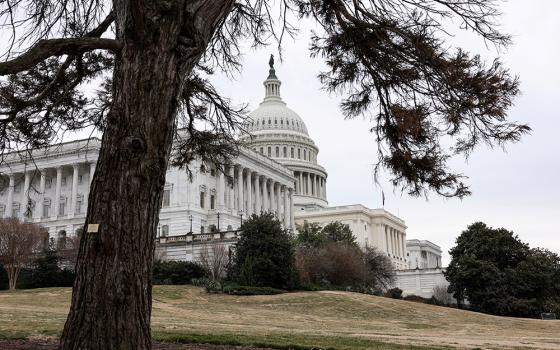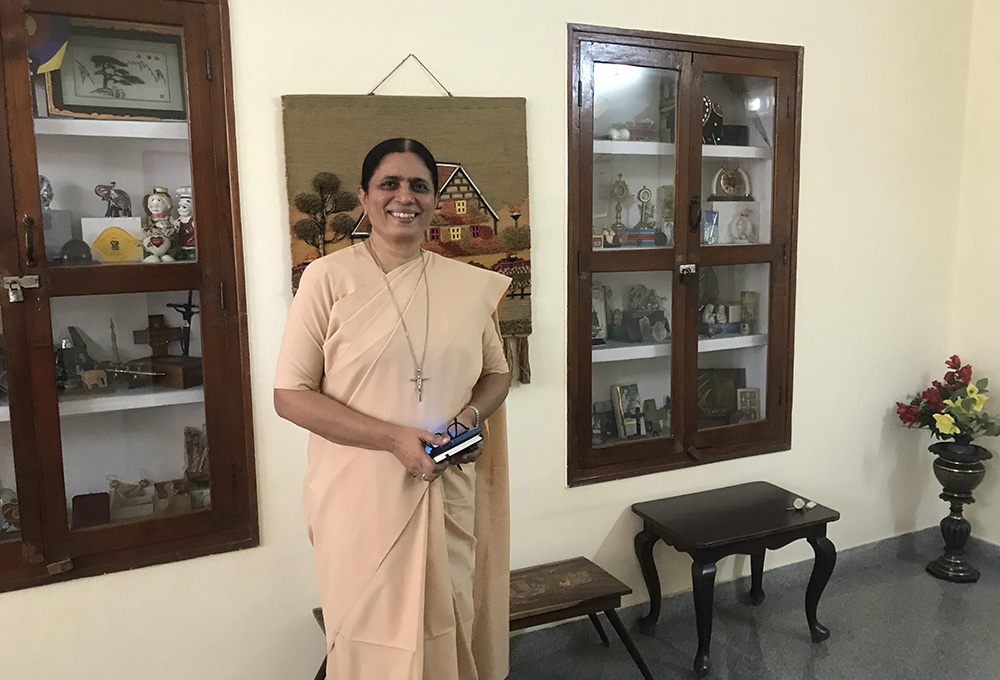
Sr. Maria Nirmalini, the superior general of the Apostolic Carmel sisters (Thomas Scaria)
Apostolic Carmel Sr. Maria Nirmalini was elected the president of the Conference of Religious India, the national body of major superiors of India's Catholic religious, in November 2021 and assumed office in January 2022. The 58-year-old educator also heads the women section of the conference as well as the Apostolic Carmel congregation.
Nirmalini advocates empowerment of women religious, mutual sharing, and leadership to tackle the oppressive patriarchal system and gender inequality within the Indian church.
On completing one year as the leader of India's more than 130,000 women and men religious, Nirmalini shared with Global Sisters Report her experience in heading the largest group of Catholic religious in the world, her accomplishments and failures as well as her aspirations and plans.
GSR: Congratulations for completing one year as the CRI president. How was the experience?
Nirmalini: I consider it a blessing to represent the entire Catholic religious community in India, not just my Apostolic Carmel congregation. The new responsibility has given me ample opportunities to understand the religious and their various ministries, missions, struggles and challenges. Every congregation has its specific role to play in society according to its apostolic vocation.
Putting them all together, we become one body as Catholic religious in India.
Any major accomplishments in the past year?
The first is for myself. I have begun to think in a universal way — more precisely, in a synodal way. The insight that I am only a drop in the ocean of God's ministry has humbled me.
I have also realized that every mission is equally important, be it education, health care, social apostolate, caring for the aged, serving the handicapped, pastoral or preaching ministry. This has helped me initiate some changes in our organization.
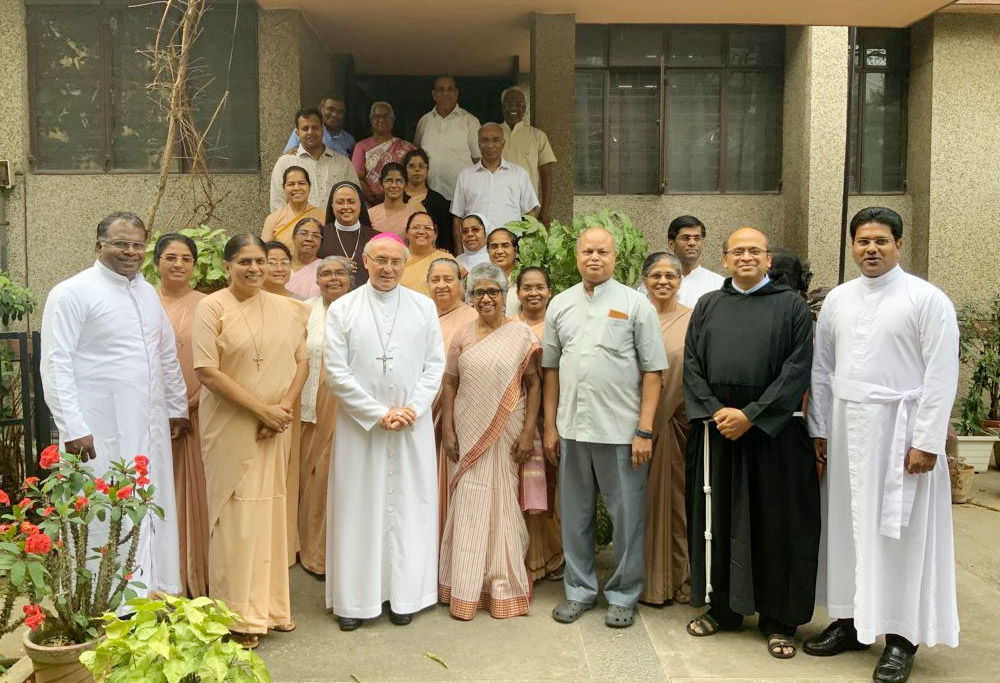
Members of the executive committee of the Conference of Religious India with Archbishop Leopoldo Girelli, apostolic nuncio to India, at the close of their meeting March 4 in New Delhi (Courtesy of Maria Nirmalini)
What are they? You previously spoke about starting "grievance cells" for religious sisters.
Yes, my first step was to set up this cell, which is operational now. The last meeting of our executive body [in early March in New Delhi] approved the cell's rules, regulations and the operation mechanism.
The cell is headed by experts from both men and women religious as well as laypeople. None of them is from the conference's executive body so that it can function as an independent body. It will then report to the conference's executive body for a final settlement.
This cell will deal with any grievance, not just sexual harassment, from both the women and men religious. They can call the cell or message it. We are now trying to get this message to the grassroots by organizing awareness sessions at regional and local levels.
Any other steps?
Lack of leadership in the religious communities was a gap that our executive body observed. The leadership concept in the church is too much institutionalized, as only the superiors play the leader with others just "obeying" them. The vow of obedience does not only mean that one should yield to external instructions; we should listen to internal calls, convictions, respecting one's dignity and potential.
We have started workshops for leadership and development training at local and regional levels for all religious. This will lead to a fully awakened community with second and third layers of leaders.
"Self-help and mutual help" is the basis of our leadership training that upholds an individual's safety and security, mental health and religious identity.
How about the decrease in religious vocations from India?
Another area we addressed was vocation promotion and sustainability. Almost every congregation has a decrease in vocations, and it threatens its sustainability. We have resolved to help each other by stressing quality rather than numbers.
I think we need to look at our formation system to help our sisters grow up with independent thinking, dignity and leadership instead of forming them to be obedient sheep. Perhaps the lack of individual growth and freedom dissuades people from joining convents.
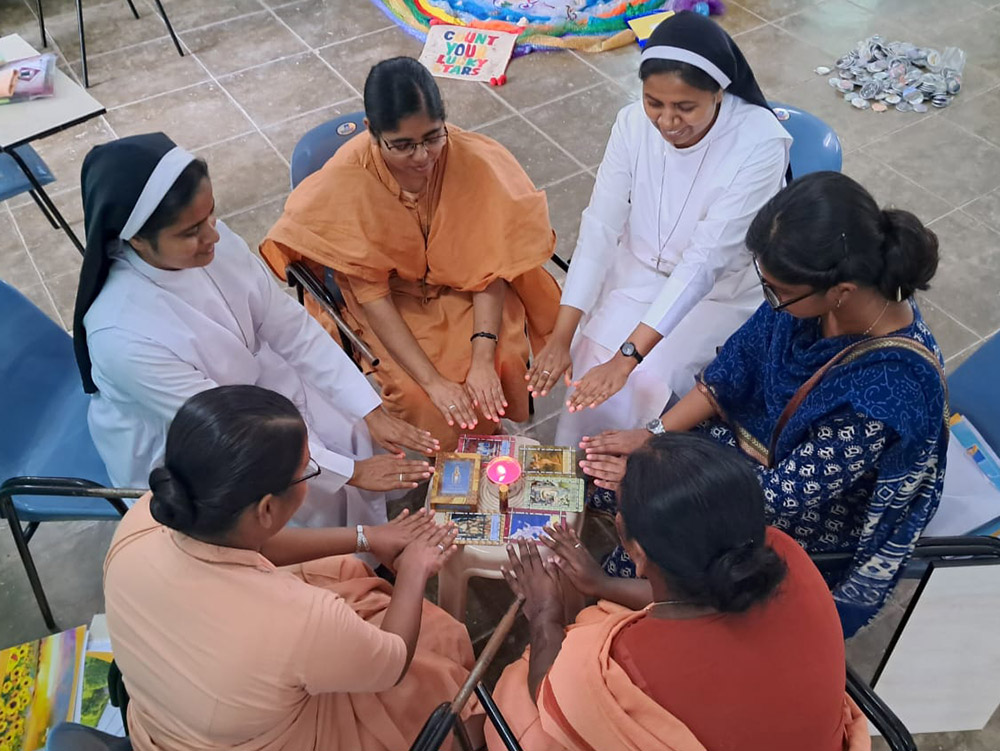
Sisters from various congregations of women religious attend a September 2022 leadership training workshop at Institute Mater Dei in Old Goa in Goa, western India. (Courtesy of Maria Nirmalini)
We now train sisters with professional skills to suit every area of life and service along with their spiritual and theology formation. We are grateful to the Hilton Foundation for its great support to form our sisters as agents of social change. [Editor's note: The Conrad N. Hilton Foundation is the primary funder of Global Sisters Report.]
Another focus is to train and integrate lay apostolates and laity vocations to become partakers in our various missions and ministries. Several congregations have taken steps in this direction, but more clarity is still needed to become more effective.
India has the largest number of Catholic religious in the world. Do you find sufficient recognition and support from the universal church?
I do not think we enjoy any special privilege or international recognition for being the world's largest religious body. But the world is now looking at us with some hope, and certain agencies are coming forward to help us serve society better.
Religious sisters and priests from India now serve the church in many countries. So also are the lay health workers and nurses whom we have trained. They are everywhere in the world, keeping up their faith and Christian witness. This truly motivates us to recognize and promote laypeople as God's messengers, healers and peace-builders in the universal church.
You have attended an international conference of major superiors in the United States. What has been your takeaway from such meetings, and how does it help Indian religious?
At international meetings, people, irrespective of their status in the hierarchy, sit around the table and discuss things as equals. Here in India, we still follow some protocols based on hierarchies. This needs to change.
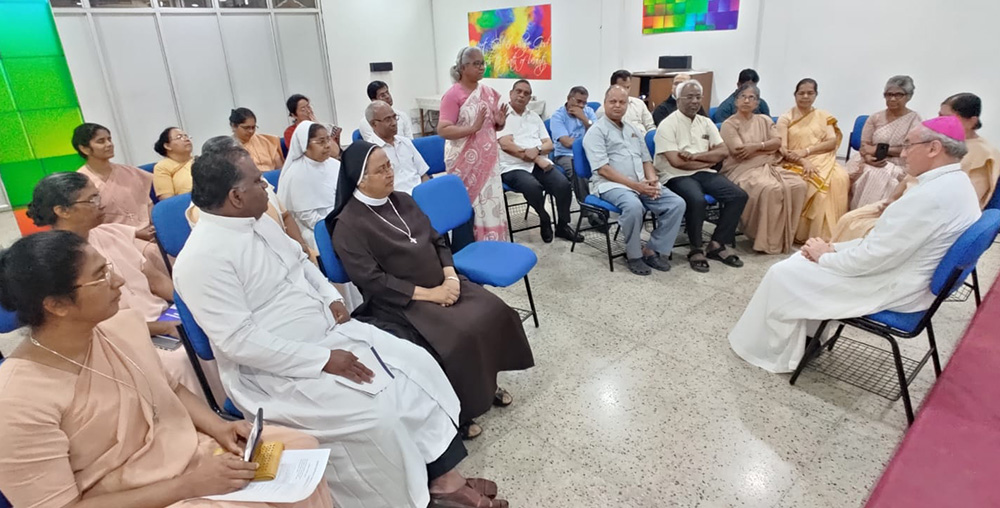
Archbishop Leopoldo Girelli, apostolic nuncio to India, meets the executive committee members of the Conference of Religious India in New Delhi in early March. (Courtesy of Maria Nirmalini)
We have started a conscious move toward breaking these egocentric protocols in India. We are trying to adapt a roundtable system in our CRI executive committee meetings and in our meetings with the bishops. This is not just about seating arrangements, but equality and fraternity. This is one takeaway for me from the international meetings.
Getting back to the Indian church, what are some challenges you face?
I took over this post when the church in India was going through several challenges from within and outside, such as sexual exploitation, gender inequality, an unfair salary system and clergy domination. I don't claim that the situation has changed now. But we have initiated definite plans and systems to address these challenges appropriately.
We have started a survey among nuns across the country to study the exploitations women religious face, such as an unfair salary system prevailing in dioceses where sisters work. The survey will study the salaries nuns receive in comparison with laypeople and priests in diocesan projects for the same jobs.
Indian convents have reported several mysterious deaths of nuns. Why do such incidents happen?
Yes, such incidents happen, unfortunately. But they happen in any given population, not just among Catholic sisters. We have initiated a national project of restructuring the religious formation system as one of accompaniment and sharing. Silent suffering has no meaning any more. We need to develop platforms for mutual sharing and psychological well-being.
This has to happen within each congregation. We have started discussing this with the major superiors and those responsible for formation. We intend to train more psychologists and counselors from among the religious to assist those who develop signs of depression. Listening, counseling and accompaniment are key factors in formation.
Coming to accompaniment, have you visited the victim who has accused a bishop of rape?
Yes, I did visit them personally and listened to their side. At the same time, I have also spent time with another group of nuns in the same congregation who oppose the victim's charges.
Advertisement
This is a complicated case, as there are two opposing sections of nuns in the same congregation. Each group has a powerful lobby behind it. Let the law take its course, but, I repeat, I am with the victim.
You head a national body of both men and women religious. Have you observed any challenges that men religious face in India?
I have observed a decline in the passion and dedication among them compared to our earlier missionaries, who were ready to die for their faith and mission. Today, many prefer to confine themselves to their comfort zones or escape from criticism by the religious fanatics. The pandemic has created many lazy missionaries, and some even got addicted to alcohol and social media.
The church could survive crises and persecutions in the past because of its missionaries' passion and commitment. We have enough of a crisis now, but many of us choose to be silent. This passive approach is not limited to only men religious. Even some women religious, too, have become passive. We need to address this together.
More than 10 Indian states have passed laws banning religious conversion. How do they affect the Catholic religious? Are they aware of such laws?
Our recent meeting did discuss the current situations, such as the anti-conversion bills and attacks on Christians. We now face challenges from some hard-line groups, the anti-conversion laws and cultural oppression.
This is not the time to withdraw from our services to society to escape criticism from the hard-line groups. We should get united and protest such challenges.
It is time we increased our network. Millions of Indians were educated in our institutions and benefited from our health care or social empowerment programs. It is time we prepared them to speak for us.





